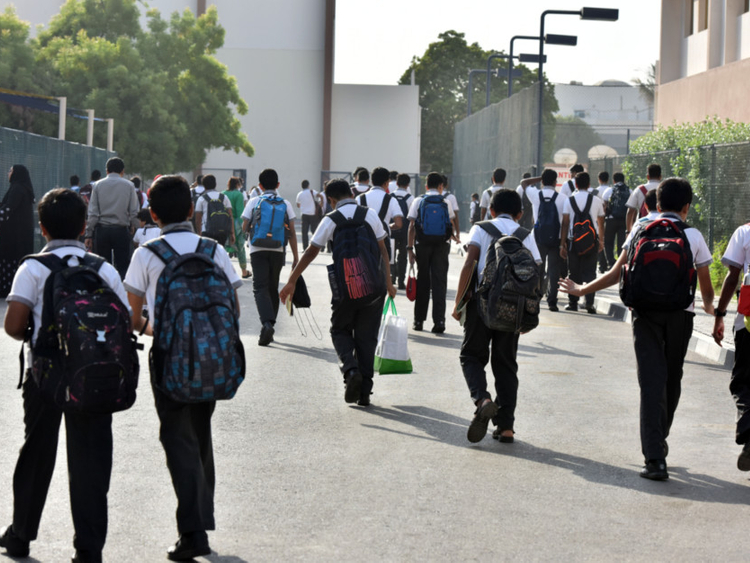
Dubai: As schools reopen after the summer break, the biggest concern for students returning for the new academic year is maintaining good health, nutrition and hygiene.
This is vital for academic performance and cutting down absenteeism in schools.
Parents, she said, are hesitant to hold back their child from school, as they feel it will impact his attendance and important lessons. “It’s always better to keep children at home for a few days and avoid taking them to the beach or the pool, as that will help the child recover and also prevent the outbreak of infection in school and elsewhere,” she added.
Students mostly return from holidays with compromised immunity. Holiday diets are far from nutritious, the kids may have had far too much junk food and their sleep cycles are erratic as they may have been staying up late. Lower immunity leads to an easier spread of infections, noted Dr Al Mulla.
To ease a child into the school routine, the doctor advises families to return at least 10 days before the start of the new academic year. “This helps the child acclimatise to his environment, get used to the change of weather and rest after the stress of travelling,” she said.
Sleep routines
Waking up early and being at school for the most part of the day can be overwhelming to a child who has had a fairly easy, fun routine for the past two months.
Ease the child into a regular bed time routine, Dr Al Mulla advises parents. “If the child has been sleeping around midnight during holidays, reset his biological clock gradually by bringing forward his bedtime by one hour each day, until he is ready to sleep by 8pm. Doing it too quickly may only make the child feel sleepy and tired. Proper sleep is important when school begins, as a sleep-deprived child will not only be tired, irritable and aggressive, he may be unable to focus in class,” she advised.
Food Habits
“Children tend to skip their meals, primarily breakfast during holidays, as they get up late. They continue the same routine when school begins. This is highly detrimental to their health and affects their alertness at school. Ensuring your child has all three meals a day, along with a few healthy snacks like fresh fruits, nuts and yoghurt etc helps the child get necessary nutrition. Serve fruits and vegetables along with healthy proteins and whole grains at each meal. These food groups boost the child’s immunity,” said Dr Ayesh.
According to current school health policies, selling junk food is prohibited in school canteens.
So, even older children who may be eating canteen food need a healthy, nutritionally balanced diet.
“Ensure that the five healthy food groups — vegetable, fruits, protein, grains and dairy — is incorporated in the right proportion in your child’s meals. For instance, a student can choose a grilled chicken sandwich made of whole grain bread, along with a fruit and complemented with a laban drink, for a balanced meal,” said Dr Ayesh.
Dr Al Ehremi added: “Parents should avoid giving their children sugary foods, such as chocolates or desserts four hours before bedtime. Keep other, external stimulants such as electronic devices and television at bay. Artificial blue light [that laptops, tablets and mobile phones emit] affects your ability to fall asleep as it confuses the body’s circadian clock and confuses the brain into thinking its daytime. Ensure your kids do not have access to these devices before bedtime.”
What should mothers pack for school lunch?
Typically, a packed school lunch should contain all of the major food groups. Consider these:
1. A portion of starchy carbohydrate (e.g. wholegrain breads, fatayer and wraps, brown rice/pasta)
2. A portion of meat or meat alternative
3. A portion of dairy (e.g. yoghurt, cheese, laban)
4. A little over one portion of vegetable
5. A little over one portion of fruit
6. Water and/or milk
Do’s and Don’ts
Do:
■ Get the kids involved: learning about food and nutrition are important life skills and should be encouraged from an early age.
■ Trying new foods from an early age plays a huge role in a child’s willingness to eat them later.
■ Shake things up: variety is key, not only does variation in diet provide nutritional benefits, but reduces boredom and lack of interest in food.
■ Make it look appetising: it’s worth spending that extra few minutes on presentation, especially for younger children. Aim for a variety of shapes, colours and textures in the lunch box.
Don’t:
■ Don’t leave it to the last minute: lack of time may mean filling up lunch boxes with unhealthy, convenience foods.
■ Don’t repeat the same lunches over and over.
■ Don’t forget about portion size: this should be specifically tailored to your child/teen’s age, size and activity levels.
■ Don’t forget about hydration: research suggests dehydration can lead to reduced concentration and performance in children.
■ Don’t forget about breakfast: ensure your child gets the first meal of the day in.
Back-to-school health tips:
■ The most common contagious infections in a school environment are common cold, influenza, diarrhoea, upper respiratory infections, chickenpox and measles. Reducing the spread of infection among schoolchildren is also the responsibility of parents. Refrain sending sick children to school for as long as recommended by your health care provider.
■ Encourage children to wash their hands with soap and water before every meal. Nails must be trimmed regularly. Children play and touch different surfaces at school and keeping their hands clean is vital to keeping infections and disease at bay.
■ Children must shower before going to school, or they can take a warm bath in the evening before going to bed.
■ Teeth must be thoroughly brushed at least twice a day.













